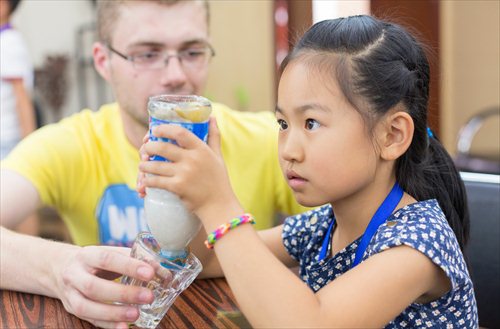HOME >> METRO SHANGHAI
Shanghai NGO launches online campaign to reduce water footprint
By Yang Lan Source:Global Times Published: 2016/7/21 18:53:00
Audience members were shocked when they were told that, on average, a person consumes 8,000 liters of water each day. "What?" "That is not me!" "I use far less water than that!" They tell this to themselves.
But the audience at the launch of the "Treat Without Meat" campaign last week were told that that's not true, because water is consumed not only when a person drinks, showers or does the laundry, but also when he or she eats, wears a pair of jeans or even just uses a computer.
Every drop counts
"We spend about 110 liters of water on domestic use, including showering, cooking and cleaning. But we 'eat' water, we 'wear' water and we need water to 'start' our devices," said Jelena Milenkovic, Shanghai operations manager of Thirst, an education-focused NGO.
The group, which was founded by Young Global Leaders of the World Economic Forum in 2011 in China and uses statistics from the Water Footprint Network to calculate the quantity of water consumed in people's daily activities. According to the network's website, the water footprint measures the amount of water consumed, including what goes into producing each of the goods and services people use.
Milenkovic said that a pair of jeans consumes 11,000 liters of water. One pound of wheat needs 500 liters of water, and 500 grams of cheese needs 2,500 liters of water, but one beef steak (only 300 grams) already consumes 4,500 liters of water, because water is consumed when the cows drink, in the grains for feeding the cows, and during meat processing. However, it only takes 822 liters of water to produce one kilo of apples.
For those who would like to reduce their water footprint but do not know how to start, simply replacing meat-based meals with vegetarian meals would save a lot of water.
So, Green Initiatives launched its action campaign "Treat Without Meat" partnering with Thirst, We Are Water Foundation and Roca.
A simple action
Substituting one meat-based meal for a vegetarian meal saves 800 liters of water. By asking individuals to treat themselves and their friends to a meal without meat and then asking friends to pass it on, the campaign hopes to save 500,000 liters of water - the amount saved if the general public substitutes 650 meat-based meals for vegetarian meals.
To track progress, participants are asked to share photos of their vegetarian meals through WeChat, Facebook, Twitter and Instagram.
"Since the official kicking-off of the campaign on Monday, we have already received 30 pictures from participants, saving 25,000 liters of water from 30 meals. I think we will reach the goal," Nitin Dani, founder of Green Initiatives told the Global Times.
Vegetarian-friendly
A vegetarian himself, Dani said that Shanghai is not bad for people living a non-meat lifestyle.
"It is not the best city, but it is not a difficult city either. Most of the Chinese, Thai and Italian restaurants in Shanghai have vegetarian options," Dani said.
Furthermore, he noted, "The Chinese government announced a plan in June to cut down meat consumption. Now, more and more restaurants will come up with vegetarian options for their customers. This is ultimately our goal, too. We hope that restaurants will provide more vegetarian options and make it more convenient for people to cut down their meat consumption."
"Treat Without Meat" is not just water-related. Its goals generally encompass the whole environment.
"The meat industry is actually a great source of pollution and greenhouse gases, which contributes to global warming. By eating less meat, we will not only save water, but also contribute to reducing air pollution and other pollution," Milenkovic said.
Thirst aims to educate China's next generation of consumers to be wiser about water usage in a world where consumers are largely unaware of the vast amounts that go into producing most of the things they use every day.
Through their education program We Water Experience, Thirst staff members, volunteers and ambassadors have been going out to schools around Beijing, Shanghai, Chongqing and 18 other provinces to teach their curriculum on water conservation.
"Through playing a video, a quiz and an interactive presentation, the organization reached over 300,000 students in the past three years," said Milenkovic.
The organization's Silk Road Challenge Innovation Competition is running at 150 schools in China. About 152,000 students from 18 provinces will think about solutions to the water crisis, develop their own projects, and compete at the national level. The 20 finalists will present their water-saving concepts at a venue in Beijing in November.
"There are many other ways to reduce water footprint, such as taking shorter showers, buying more local products and keeping the tap in low flow while washing dishes," said Dani.
Green Initiatives is an organization that's been based in Shanghai since 2009. It aims to increase awareness of environmental issues and create projects to involve people or companies in reducing the speed of environmental pollution and degradation.


Newspaper headline: Save the water, eat the vegetable
But the audience at the launch of the "Treat Without Meat" campaign last week were told that that's not true, because water is consumed not only when a person drinks, showers or does the laundry, but also when he or she eats, wears a pair of jeans or even just uses a computer.
Every drop counts
"We spend about 110 liters of water on domestic use, including showering, cooking and cleaning. But we 'eat' water, we 'wear' water and we need water to 'start' our devices," said Jelena Milenkovic, Shanghai operations manager of Thirst, an education-focused NGO.
The group, which was founded by Young Global Leaders of the World Economic Forum in 2011 in China and uses statistics from the Water Footprint Network to calculate the quantity of water consumed in people's daily activities. According to the network's website, the water footprint measures the amount of water consumed, including what goes into producing each of the goods and services people use.
Milenkovic said that a pair of jeans consumes 11,000 liters of water. One pound of wheat needs 500 liters of water, and 500 grams of cheese needs 2,500 liters of water, but one beef steak (only 300 grams) already consumes 4,500 liters of water, because water is consumed when the cows drink, in the grains for feeding the cows, and during meat processing. However, it only takes 822 liters of water to produce one kilo of apples.
For those who would like to reduce their water footprint but do not know how to start, simply replacing meat-based meals with vegetarian meals would save a lot of water.
So, Green Initiatives launched its action campaign "Treat Without Meat" partnering with Thirst, We Are Water Foundation and Roca.
A simple action
Substituting one meat-based meal for a vegetarian meal saves 800 liters of water. By asking individuals to treat themselves and their friends to a meal without meat and then asking friends to pass it on, the campaign hopes to save 500,000 liters of water - the amount saved if the general public substitutes 650 meat-based meals for vegetarian meals.
To track progress, participants are asked to share photos of their vegetarian meals through WeChat, Facebook, Twitter and Instagram.
"Since the official kicking-off of the campaign on Monday, we have already received 30 pictures from participants, saving 25,000 liters of water from 30 meals. I think we will reach the goal," Nitin Dani, founder of Green Initiatives told the Global Times.
Vegetarian-friendly
A vegetarian himself, Dani said that Shanghai is not bad for people living a non-meat lifestyle.
"It is not the best city, but it is not a difficult city either. Most of the Chinese, Thai and Italian restaurants in Shanghai have vegetarian options," Dani said.
Furthermore, he noted, "The Chinese government announced a plan in June to cut down meat consumption. Now, more and more restaurants will come up with vegetarian options for their customers. This is ultimately our goal, too. We hope that restaurants will provide more vegetarian options and make it more convenient for people to cut down their meat consumption."
"Treat Without Meat" is not just water-related. Its goals generally encompass the whole environment.
"The meat industry is actually a great source of pollution and greenhouse gases, which contributes to global warming. By eating less meat, we will not only save water, but also contribute to reducing air pollution and other pollution," Milenkovic said.
Thirst aims to educate China's next generation of consumers to be wiser about water usage in a world where consumers are largely unaware of the vast amounts that go into producing most of the things they use every day.
Through their education program We Water Experience, Thirst staff members, volunteers and ambassadors have been going out to schools around Beijing, Shanghai, Chongqing and 18 other provinces to teach their curriculum on water conservation.
"Through playing a video, a quiz and an interactive presentation, the organization reached over 300,000 students in the past three years," said Milenkovic.
The organization's Silk Road Challenge Innovation Competition is running at 150 schools in China. About 152,000 students from 18 provinces will think about solutions to the water crisis, develop their own projects, and compete at the national level. The 20 finalists will present their water-saving concepts at a venue in Beijing in November.
"There are many other ways to reduce water footprint, such as taking shorter showers, buying more local products and keeping the tap in low flow while washing dishes," said Dani.
Green Initiatives is an organization that's been based in Shanghai since 2009. It aims to increase awareness of environmental issues and create projects to involve people or companies in reducing the speed of environmental pollution and degradation.

An activity in Beijing held by Thirst to raise awareness of water conservation to children.

Launch of Treat Without Meat campaign in Shanghai
Photos: Courtesy of Thirst and Green Initiatives
Newspaper headline: Save the water, eat the vegetable
Posted in: Metro Shanghai